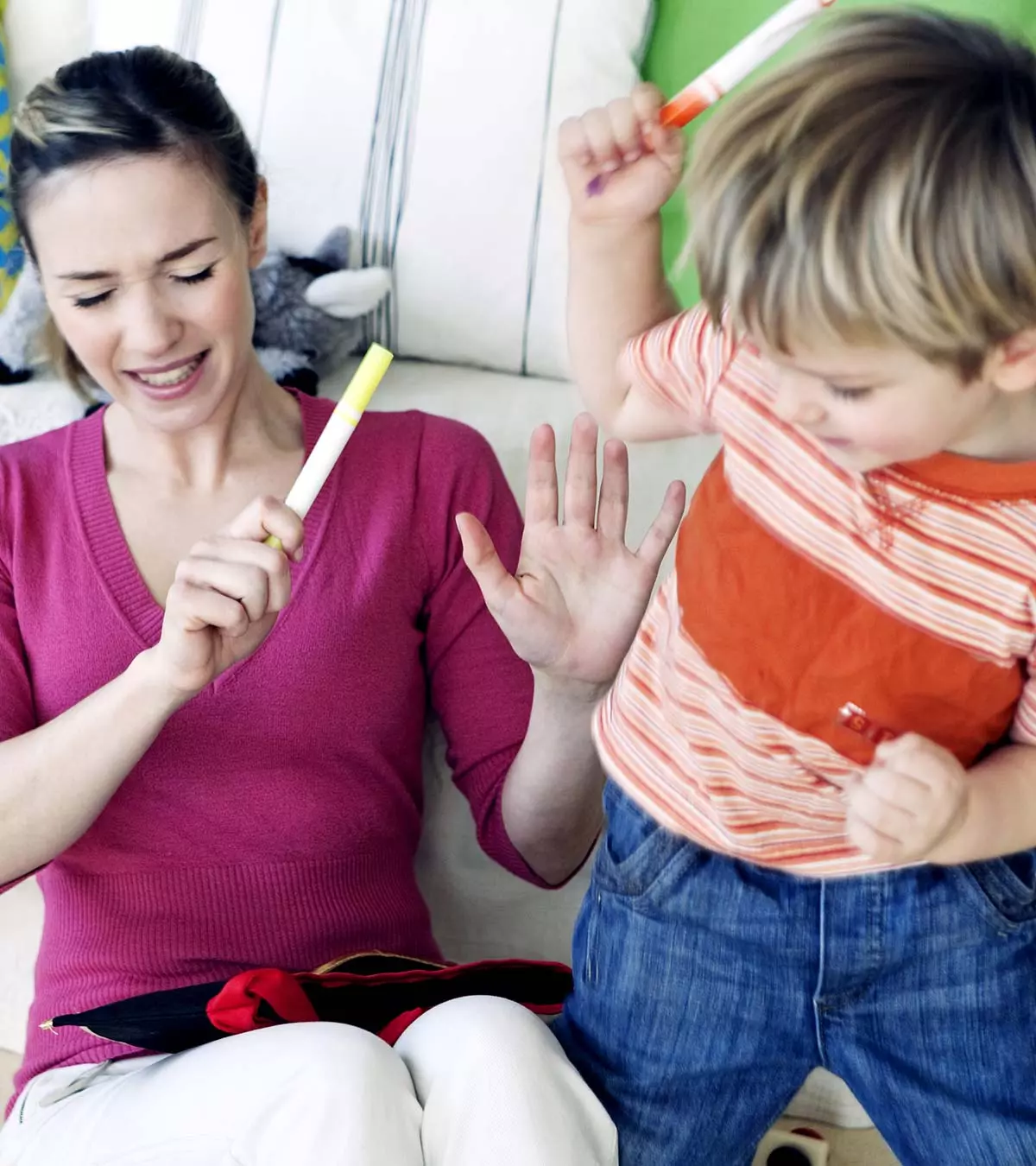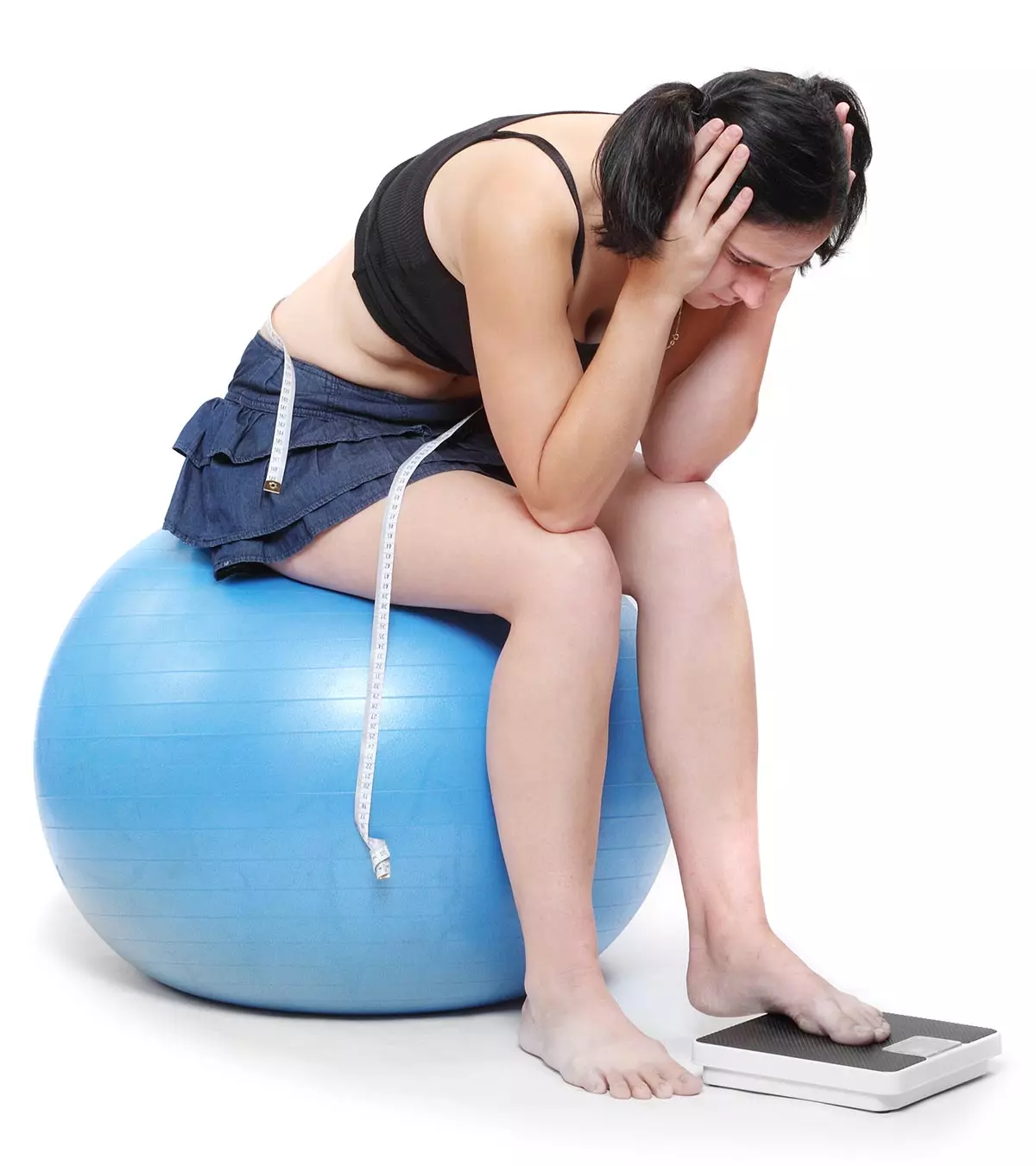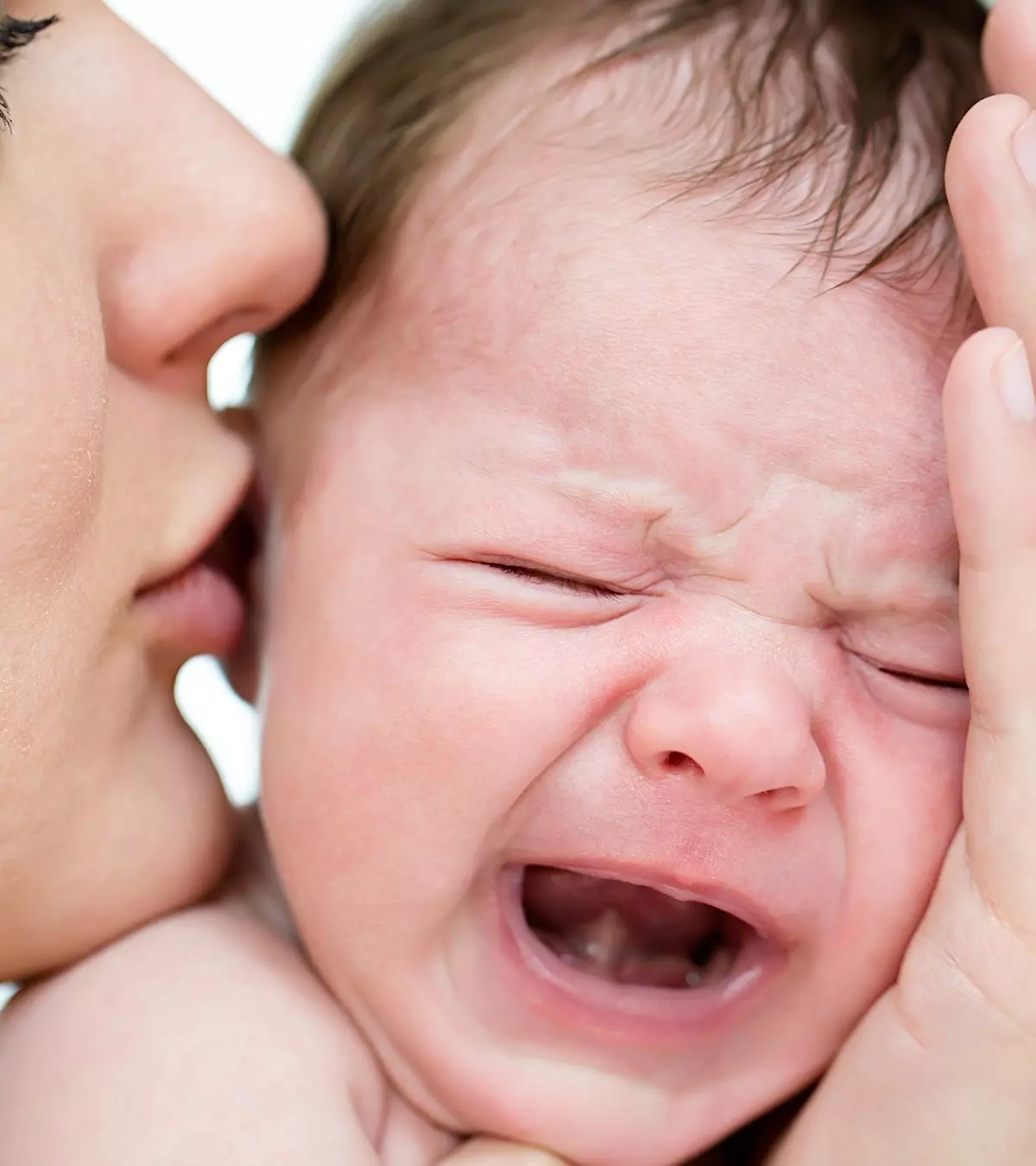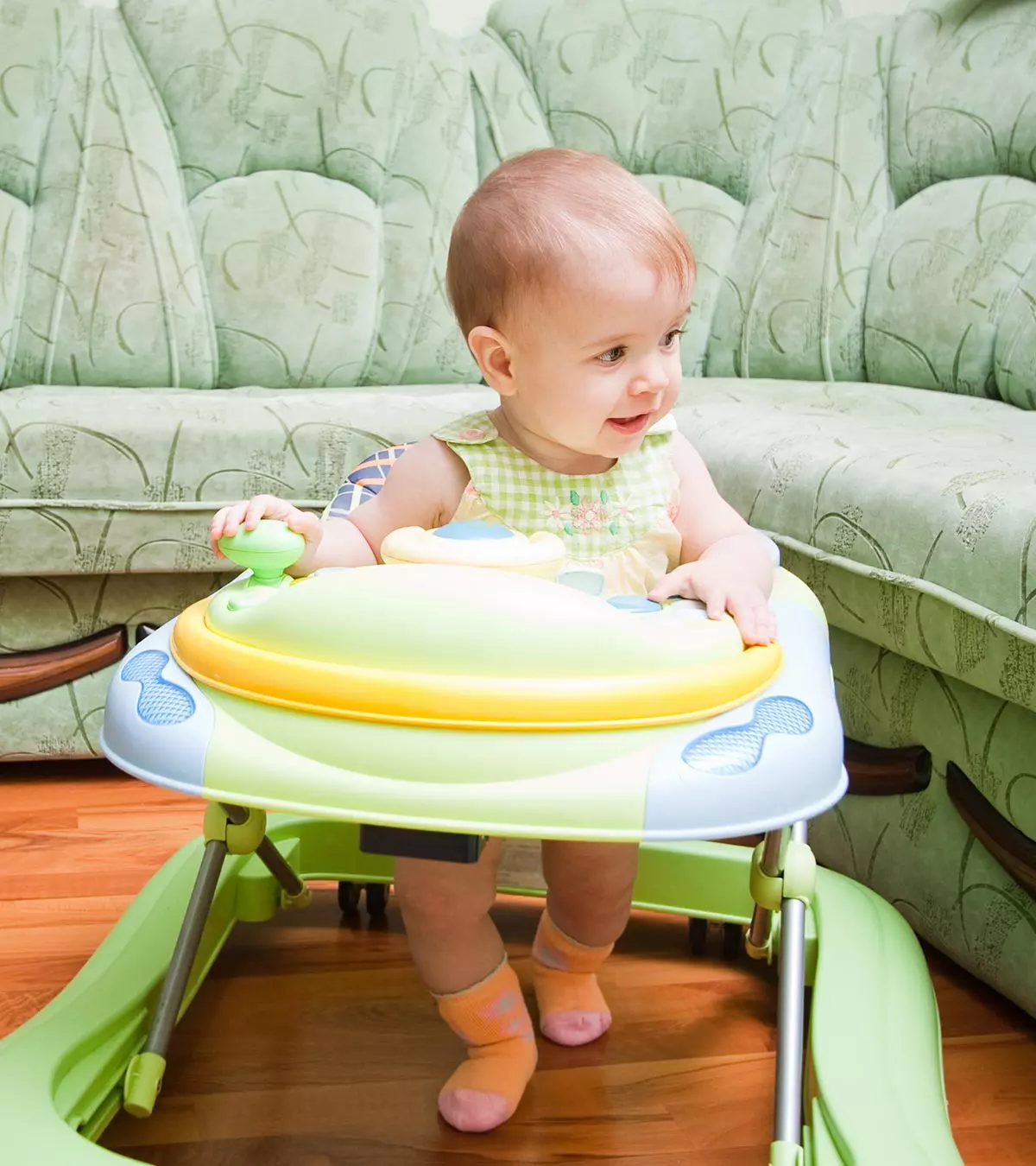
Image: Midjourney/ MomJunction Design Team
Adolescence is the finest time of life since it is filled with new freedom, enthusiasm, beauty, and enthusiasm. This glorious period, however, has its challenges for both girls and boys. Teen girl problems may include issues such as anxiety, body image consciousness, emotional dilemmas, identity crisis, and the first menstrual period. Teenage is also tricky as it tends to make minor issues seem like major problems. Teenage girl problems often arise from emotional, social, and academic pressures, which can be aggravated by the influence of social media and peer affinities. Parents play a vital role in helping daughters deal with these teen girl problems. Read on to learn in-depth about the issues your daughter may be dealing with and how you may assist her in handling them.

Key Pointers
- Some of the most common problems teenage girls face relate to their appearance, education, relationships, and bullying.
- Social media today exposes teenage girls to dangerous messages that push them to adhere to unrealistic standards.
- Parents should fully support and understand their teenage daughters so they can navigate the challenges of adolescence.
Teen Problems: Are Girls More Affected Than Boys?
During adolescence, girls have been reported to have double the mood swings than boys. It has been observed that before puberty, the prevalence of mood swings is almost the same in boys and girls, about 3-5%. But during the teen years, it is usually girls who are diagnosed with mood disorders.
This is because girls seem to attain emotional maturity faster than boys and this sensitivity could make them more vulnerable to teen problems than boys (1).
Also, girls are twice more susceptible to anxiety and stress than boys as females are more sensitive to low levels of corticotropin-releasing factor (CRF), the stress response managing hormone in mammals (1).
10+ Common Teenage Girl Problems
The most common teen girl problems include appearance, education, dating, bullying, friendship, self-esteem, peer pressure, anxiety, substance use, menstruation, depression, anxiety, panic attacks, and cyber addiction.
In this post, we list some common problems of adolescence that teenage girls experience and their possible solutions. So, keep reading to support and help your little lady better.
1. Appearance

This issue is probably number one on every teenage girl’s problem list. Almost 35% of teenagers are believed to be worried about their body image (2). During teenage your daughter’s body is constantly changing and she has to cope with it on top of multiple different things. Moreover, seeing and hearing about figure-perfect bodies adds some unrealistic expectations. In addition to peer pressure, family environment, ability, disability, the attitude of peers, and cultural background are some factors that influence your child’s body image (3). The influences of media on teenagers is another factor that plays a profound role in their body consciousness and self-image.
 Quick fact
Quick factSolution (3):
- Monitor your teenager very closely.
- Discuss how these perfect images on social media are highly digitally manipulated.
- Ensure that your young daughter doesn’t develop unhealthy eating habits in order to reduce the risk of eating disorders.
- Make sure the people she spends time with do not act adversely.
2. Education
The ages 13 to 20 are usually when teenagers are in their career formative years and are constantly under academic pressure to prove their mettle by scoring high, doing well in exams, and on other educational fronts. This immense academic pressure on your young girl leads to stress. Studies have also shown that 45% of all teenagers have school or education-related stress (4).
Solution:
- Make your teenage girl understand that she should study well and score good marks, but explain how grades do not represent her worth. Tell her how low grades are not indicators of her being less educated or less talented. There are many ways and many tests where she can perform better.
- Encourage her to take up extra-curricular activities that she likes. This will help her unwind and enhance her focus and concentration.
3. Dating
A sudden interest in romantic relationships can make life more difficult for teens. You might find your girl falling for her first crush and be vulnerable to romantic liaisons. A lot of teenage girls experience healthy crushes and early-age love, too. Experts suggest that healthy romantic relationships during adolescence can help teens develop into adults who form healthy relationships later in life.
Dating during the teenage years can develop social skills, learn about other people, and grow emotionally (5). Around 35% of teens in the US have some experience with dating or romantic relationships (6). However, peer pressure, changing times, and the advancement of media have associated sex with teenage romantic relationships. The pressure of getting involved in sexual activities may be overwhelming for your teen. As such emotions and feelings can be intense and confusing, you must explain to her the importance of taking the necessary precautions, indulging in safe sex, and the concept of consent.
Solution:
- Make her understand that it’s perfectly alright to say no to sex.
- Normalize discussions about romantic relationships and sexuality. Foster an environment where she feels comfortable enough to share details about her relationships with you.
- Teach her how to be safe and the precautions to be taken while having sex to prevent unplanned pregnancies, STDs, and exploitation (7).
4. Bullying

Bullying is one of the prominent teen girls’ problems. According to a Pew Research Center survey, about 55% of all teens say that bullying is a major problem among their peers (8), whereas 16% of school students in the US reported cyberbullying (9). Overall, nearly half (46%) of the teens in the US between the ages of 13 and 17 have reported cyberbullying in 2025 (10).
Bullying, irrespective of whether it is happening offline or online can impact a teen’s emotions and may even lead to self-harming. It may also make your teenage girl feel depressed, act strangely, or keep to herself.
Bullying can be physical, mental, or emotional. A.E. Dooland, a blogger, reflects on how her best friend Zoe’s new friend, Sally, and her friends bullied her during her teenage years. She writes, “Sally’s friends would degrade me to my face whenever they saw me…When my homeroom teacher failed to protect me against this bullying in class, they left me notes telling me that I was such an awful person that not even the teachers liked me. I was weird (i).” Such bullying can harm the psyche of a teenager and make them withdraw into themselves, causing mental health issues.
 Do remember
Do rememberSolution:
- Make sure your teenage girl discusses everything with you.
- If you feel she is being bullied, advise her on how to face it and stand up against it.
- Teach her how she can come out of such situations and how you too were bullied sometimes when young. Knowing she is not alone in facing the issue of bullying can help her deal with it better.
5. Friendship
Teenage years can make relationships seem complex. Even the beautiful bond of friendship often meets shaky grounds. This is because your child is still developing social skills as a teenager. Your daughter might love her best friend one moment and might pick an ugly fight the next. This may result in aggression and mood swings.
Caroline Cavanagh, a mother of two who works with teenagers, observes that most of the teens approaching her are girls. She says, “I have a teenage daughter and a teenage son. But my daughter has many more teenage friendship problems than my son has. So this aspect has manifested it in my life, too (ii).”
Solution (11):
- Teach your teenage girl that having disagreements or small fights with friends is normal. But fights don’t make any friends bad.
- It is alright to have problems and differences of opinion. Even her best friend might not always agree with her on something.
- Explain to her that the best way to deal with such fights is to discuss them and then forget about them.
- Monitor the kind of friends she makes. Ensure she is in the right company.
- Teach her that it is okay to apologize when wrong.
6. Self-Esteem

Teenage girls tend to compare themselves, their body, and their appearance to other girls of the same age. This unconsciously creates pressure on them to look a certain way. According to a study, teenage girls are more likely to be associated with lower self-esteem. It can happen due to several factors, including obesity, TV time, team sports participation, school performance, and parenting style (12). The physical, emotional, and hormonal changes can also lower your teenage daughter’s confidence. She might also get extremely conscious about everything she does, wears, or even talks about, leading to self-esteem issues.
Solution:
- Encourage her to look up to and idolize famous personalities who spread messages of body positivity.
- Patiently explain to her that every person is different from the other. We all are unique and have our own set of positives and negatives.
- Encourage her to indulge in her favorite activities and hone her skills instead.
7. Peer Pressure
Peer pressure forces teenage girls to behave like their peers or popular girls to feel a sense of belonging. By giving into peer pressure they feel one with their peers. However, this can make them take up habits with negative effects or ones they otherwise aren’t interested in.
Solution:
- Explain to your daughter what peer pressure is to help her identify it.
- Tell her she is unique in her own way and can choose to be a certain way without feeling any detachment from her peers. For example, tell her how it is alright to like a certain band even if her peer group is not following them.
- Explain how her opinions, views, choices, hobbies, fashion sense, and even eating habits make her entirely what she is. She need not give in to peer pressure just to feel one of them.
8. Substance Use
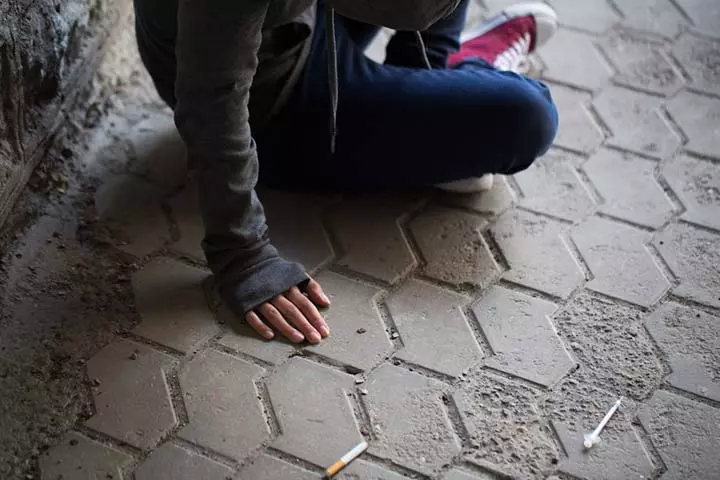
This is a major problem that most teenagers face across the world today. Substance use has a huge impact on the child’s mental, physical, and emotional well-being as well as their academic success (13). Teenagers usually resort to substance use to ease their stress, and feel secure and assured from within. Moreover, in most cases, it is peer pressure that introduces teenage girls to substance use and abuse.
Solution:
- Talk to your young girl about the side effects and probable detrimental effects of substance abuse.
- Explain how these substances give a temporary high but are harmful to her system, body, mind, and soul.
- If she wants to try drinking or something else meant for adults, make her do it in your presence. This may help keep her safe and not fall for peer pressure.
9. Menstruation
This is the time your teenage girl will have her first menstrual cycle. Periods come with a plethora of issues such as bodily changes, hormone imbalances, cramps, nausea, confusion regarding what kind of menstrual products to use, how to deal with the pain, and more. This might lead to many misconceptions and queries related to menstruation.
 Research finds
Research findsTo help her through this phase, consider using the tips below.
Solution:
- Clear all her doubts related to menstruation.
- Explain to her how menstruation is natural. Tell her how every girl goes through this and how it is part of leading a normal life.
- Get her a pack of napkins or other menstrual products and ask her to always carry a napkin, tampon, or other product in her bag for emergencies.
- She could also keep a few medicines or use a hot water bag, in case she suffers from headaches or menstrual cramps.
- Teach her how to track her monthly periods and talk to her about PMS-ing too.
10. Depression

When things are difficult, or when they are unable to meet the standards that their peers have maintained, they may feel pressured and depressed. Low grades, breakups, high parental expectations, weight gain, and substance use, are some of the other major teen girl issues that may trigger depression in teenage girls.
Solution:
- Look for signs of depression in your teenage girl.
- Excess desire to sleep or total sleep deprivation could also be a sign of depression.
- If you think she is losing interest in things she used to enjoy doing, talk to her about it.
- Ensure she remains happy and is occupied in activities she enjoys.
- If she talks about death, suicide, etc., then you should seek professional help.
11. Anxiety
It’s common for teenage girls to experience small fears. However, when these fears escalate to the point where they begin to impact school, eating habits, and friendships, it could indicate an anxiety disorder. There are several types of anxiety disorders, each with its distinctive symptoms. For example, separation anxiety causes the child to fear being away from their parents, while social anxiety is the reluctance to visit crowded places. Alternatively, general anxiety causes them to worry a lot about the future (14).
Solution (15):
- Don’t dismiss your child’s fears. They may not seem grave to you, but they are serious matters to them. Therefore, talk to them and listen carefully to what they have to say.
- Tell them how it is normal to feel anxious at times. Gain their trust and provide positive reinforcement for the activity they are afraid to do.
- Help them maintain a healthy diet and exercise routine. You could also teach them breathing exercises, like bubble breaths, to help them tackle anxious spells.
- If anxiety becomes too intense, consult a professional such as a counselor, psychologist, or psychiatrist.
12. Panic attack

A panic attack causes an overwhelming fear of losing control. It can cause symptoms such as dizziness, discomfort, and lightheadedness. Other panic symptoms include a rapid heartbeat, a feeling of being smothered, difficulty breathing, tremors, and sensations like pins and needles. These symptoms can make a teen avoid situations that cause pain attacks (16).
- Validate their feelings, help them understand that they will pass, and model being calm in such situations.
- Teach the teen simple tricks, such as reciting the alphabet in their head or breathing exercises, to deal with the attacks better.
- Encourage the teen to revisit the place where they had a panic attack to prevent avoidance and keep the fear from getting more intense.
- You could also take them to a safe space or distract them with different sensory inputs to pull them out of the attack.
13. Cyber addiction
While internet usage is common among teenagers today, using the internet beyond healthy limits and experiencing physical and mental issues when unable to access it may indicate addiction to the cyber world. This addiction can lead to neglecting other important aspects of life, such as school, work, and friendships. It can also cause health issues such as dry eyes, headaches, and backaches due to sitting before the screen for long hours (19).
Since 2014-15, the percentage of teens using popular streaming and social media such as YouTube, TikTok, Instagram, and Snapchat has grown. 95% of teens between 13 and 17 watch YouTube, while 67% use TikTok, followed by 62% for Instagram and 59% for Snapchat. Of these, teenage girls are more likely to use TikTok than boys (20).
Solution:
- Make the teen reflect on why they are inclined to spend so much time on the internet, and then resolve the underlying issues.
- Gradually reduce the time the teen spends on the internet and teach her relaxation exercises to cope with the withdrawal symptoms.
- Spend some quality time outdoors with the teen.
- Seek professional help if the addiction has become difficult to overcome.
Adolescent Mental Health Red Flags To Watch Out For
Studies show around 49.5% of adolescents have had some mental disorder at some point (21). Yet, identifying if a teen is struggling with mental health issues can be challenging. They can mask their emotions. Plus, the signs they display may sometimes be mistaken for typical rebellious behavior if not considered within the context of a larger mental health issue. Therefore, it’s crucial to recognize common red flags that could signal an underlying psychological concern.
- Disinterest in activities: Teens usually develop and drop interests frequently. However, if they stop showing interest even in something they were interested in before, it may be a sign of a mental health issue.
- Frequently feeling tired: Fatigue is a common symptom of mental health disorders. If your teen is experiencing excessive tiredness or a lack of energy, it may indicate an underlying mental health concern.
- Sleeping or eating difficulties: Another common sign of mental disorders is having difficulties in eating or sleeping. Observe their eating and sleeping patterns. Do not allow them to use their phones while eating or before bed.
- Isolation: Teens sometimes take breaks to escape uncomfortable situations. However, if they remain unusually quiet or avoid social interactions, it could be a sign of an underlying mental health concern.
- Poor diet and exercise routines: If your teen suddenly starts obsessing about their body and starts following improper diets and exercise routines to lose or gain weight, it may be a sign of a mental disorder. In this case, seeking prompt medical intervention is vital.
- Self-harming tendencies: Banging their heads or hitting themselves with an object are some of the most common self-harming behaviors with certain emotional or psychological struggles. Some studies show that around 17% of teens in the US indulge in self-harm. The rate of self-harm in college-going teens ranges between 17-35% (22). If your teen talks about suicide or self-harms excessively, seek immediate intervention.
- Substance abuse: Studies show nearly 33.1% of teens have alcohol addiction, and 46.6% of teens have taken some form of drugs by the time they are in 12th grade (23) (24) (25). Teenagers and those with mental disorders are more likely to develop addiction to substances. These addictions can lead to physical and mental issues in the future (26). Hence, nipping them in the bud is necessary.
- Risky behavior: Risky behaviors, like reckless driving, are common ways teens manage stress. If your usually quiet teen has suddenly begun acting irresponsibly, it may be a sign of a mental health concern. From peer pressure to bullying and breakup, there can be several reasons that a teen may feel stressed or overwhelmed.
- Depression: Chronic stress is one of the most common causes of depression in teens. Persistent feelings of sadness, worthlessness, and hopelessness, social isolation, and complaints of physical illnesses such as headaches and stomach aches are some common signs that may indicate depression in teens (27).
- Hallucinations: If your teen starts behaving erratic and mentions talking to people you cannot see or hear, seek immediate medical intervention (28). Hallucinations in teens aren’t typical and can indicate an underlying mental health issue.
If your teen is showing these symptoms, you should talk to them and help them deal with the underlying problems. Consulting a professional could also be beneficial.
Ways To Help A Teen Who’s Struggling
There are several ways you can support a struggling adolescent and make them feel heard, understood, and supported. Here’s what you can do:
- Stay in touch: Talk to them often to understand what is going on in their lives. Take time every day or every week and schedule slots where you can talk with them without interruptions.
- Be an active listener: Pay attention, offer encouragement, and make them feel comfortable sharing their thoughts. Even if you do not like what they are saying, try not to interrupt or react immediately. Let them finish what they are saying before giving your opinion.
- Encourage healthy habits: Help them maintain a proper eating and exercise routine to boost their confidence and well-being. This will help them develop good physical and mental health.
- Promote outdoor activities: Encourage them to spend more time in nature and limit screen time (29). Take them on nature walks and hikes to improve their health.
- Support good sleep habits: Help them improve their sleep schedule for better mental and physical health. Avoid using the phone in the bedroom. Instead, you can fix a place to ‘deposit’ the phone before bed so they can enjoy uninterrupted sleep.
- Strengthen your bond: Build a trusting relationship so they feel safe coming to you with their problems. Ensure you do not talk about their problems with others. It will make them lose trust in you. Moreover, if you promise to resolve some issue, do it without delay.
- Help navigate teenage challenges: Be there for them as they face issues like menstruation, dating, friendships, sexuality, and emotional changes. Let them know they can always count on you. This can make a big difference in their well-being.
- Seek professional help: If their struggles persist or worsen, connect them with a professional for expert guidance. You can ask their friends to convince them if they are unwilling to go to a professional.
Frequently Asked Questions
1. Are teenage daughters difficult?
Teenage can be a difficult time for teenagers and parents. Your teenage daughter is transitioning into adulthood, and they undergo many physical changes. Some studies suggest that girls are more prone to mood disorders at this age, which could make them difficult to handle (1). Treat your daughter with love, care, and patience; they need your support in this phase.
2. Why do girls feel uncomfortable in school?
A girl could feel uncomfortable in school for several reasons, such as a new school, differences with classmates, lack of friends, and teen peer pressure. Bullying could be another serious reason, as research shows more girls are bullied in school than boys (8). Your daughter may also have a tough time at school if a senior or teacher makes the girl uncomfortable. In such cases, parents or guardians must intervene and rid the girl of the situation.
3. Why do girls drop out of school?
Poverty, financial struggles, and family issues are among the primary reasons girls drop out of school. Studies show that girls from underprivileged families are three times more likely to drop out of school (30). Other reasons include academic struggles, teenage pregnancy, lack of support from family and school authorities, etc.
4. How should I help my teenage daughter deal with stress?
Ways by which you can help your teenage daughter deal with stress include reducing the time they spend on social media, improving their lifestyle habits, teaching them to rationalize their thoughts, and helping them manage their emotions in a better way (31).
5. How can I help my teen daughter cope with feelings of loneliness or isolation?
To help your teenage daughter cope with feelings of loneliness and isolation, you could improve their social connections, encouraging them to go out more, and enrolling them in activities that require interaction with children of similar age (32).
6. How can I empower my teenage daughter to handle challenges?
Empowering your daughter starts with open communication and a supportive environment. Encourage her to share her feelings and validate her experiences. Involve her in activities that boost her confidence, such as sports, arts, or community service. By offering timely guidance while respecting her independence, you can help her build self-esteem and resilience to face challenges.
Teenage can be a tricky stage to navigate since adolescents are simultaneously treated as both children and adults. Further, teenage girls may find it hard to cope with all the physical and emotional changes they experience during this stage. As a result, they may face and have many questions about teenage girl problems such as menstruation, dating, depression, issues with their sexuality, and friendships. The best way to help them cope with these situations is by ensuring they can rely on you for help. Though they may try to resolve some issues independently, knowing that you have their back can make all the difference.
Infographic: What Common Problems Does A Teenage Girl Face?
The transition from childhood to maturity and the physical, mental, and social changes accompanying puberty can make the teenage years difficult and stressful for many girls. So, read through the infographic below to discover and understand typical issues teen girls may encounter that may affect their physical and mental health.
Some thing wrong with infographic shortcode. please verify shortcode syntax
Illustration: Common Teenage Girl Problems And Their Solutions
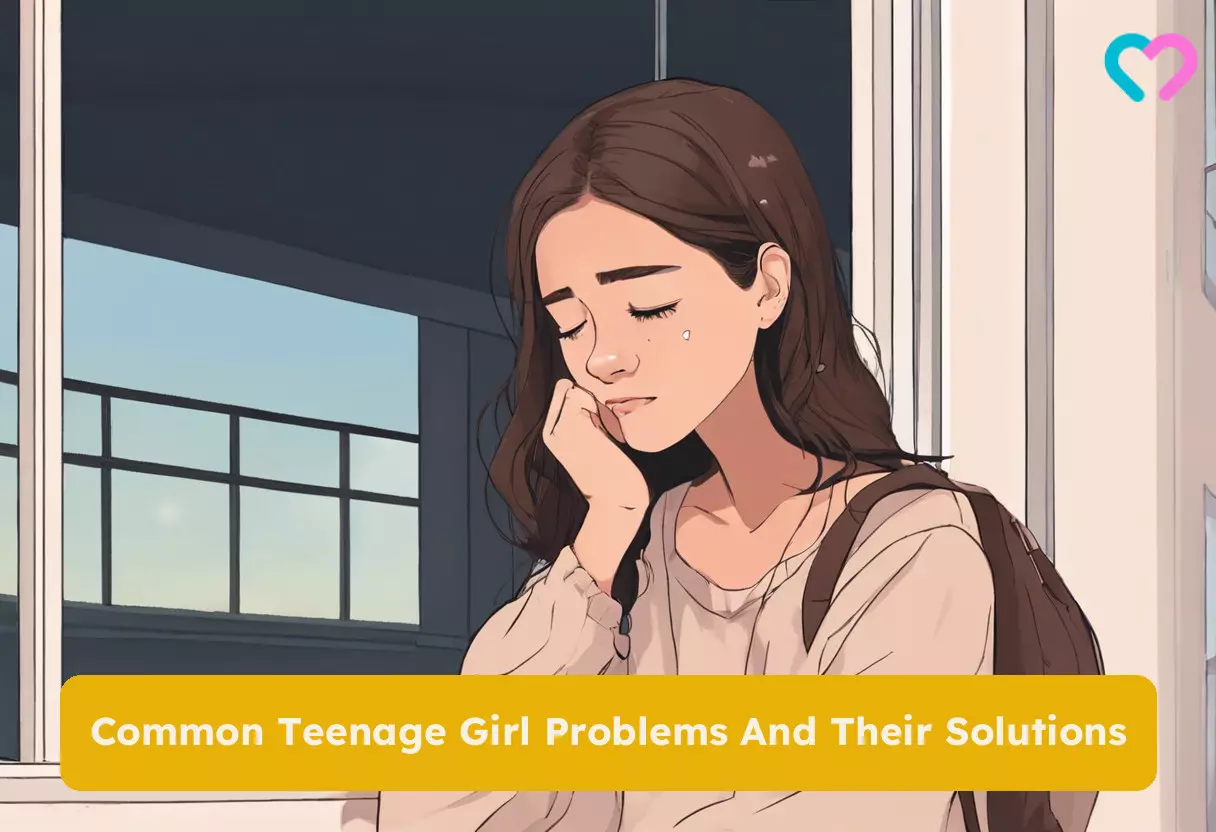
Image: Stable Diffusion/MomJunction Design Team
Personal Experience: Sources
MomJunction articles include first-hand experiences to provide you with better insights through real-life narratives. Here are the sources of personal accounts referenced in this article.
i. A personal narrative on the life-long impacts of bullying.
https://aedooland.com/2019/10/11/a-personal-narrative-on-the-life-long-impacts-of-bullying
ii. Dealing with teenage friendship problems.
https://www.youtube.com/watch?v=MW4XzyZe5mQ
References
- Mood Disorders and Teenage Girls.
https://childmind.org/article/mood-disorders-and-teenage-girls/ - Body image in childhood
https://www.mentalhealth.org.uk/explore-mental-health/articles/body-image-report-executive-summary/body-image-childhood - Body image: pre-teens and teenagers
https://raisingchildren.net.au/pre-teens/healthy-lifestyle/body-image/body-image-teens - School Stress Takes A Toll On Health Teens And Parents Say
https://www.npr.org/sections/health-shots/2013/12/02/246599742/school-stress-takes-a-toll-on-health-teens-and-parents-say - Healthy Relationships in Adolescence.
https://opa.hhs.gov/adolescent-health/healthy-relationships-adolescence - Chapter 1: Basics of Teen Romantic Relationships.
https://www.pewresearch.org/internet/2015/10/01/basics-of-teen-romantic-relationships/ - What Are the Goals of Sex Education For Youth?
https://www.plannedparenthood.org/learn/for-educators/what-are-goals-sex-education-youth - The concerns and challenges of being a U.S. teen: What the data show.
https://www.pewresearch.org/short-reads/2019/02/26/the-concerns-and-challenges-of-being-a-u-s-teen-what-the-data-show/ - Bullying for Your 16-Year-Old.
https://toolsforyourchildssuccess.org/tools/13-years-old/bullying/ - Teens and Cyberbullying 2025.
https://www.pewresearch.org/internet/2025/12/15/teens-and-cyberbullying-2025/ - 6 Ways to Help Your Teen Make and Keep Great Friends.
https://www.goodtherapy.org/blog/6-ways-to-help-your-teen-make-keep-great-friends-0701164 - Auden C. McClure et al.; (2011); Characteristics Associated with Low Self-esteem among U.S. Adolescents.
https://pmc.ncbi.nlm.nih.gov/articles/PMC2914631/ - Preventing Drug Use among Children and Adolescents.
https://www.cdc.gov/cannabis/media/pdfs/2025/05/PODAT-InBrief-Preventing-Drug-Use-Child-Adolescents-FINAL.pdf - Anxiety and Depression in Children
https://www.cdc.gov/children-mental-health/about/about-anxiety-and-depression-in-children.html - Anxiety and Stress in Teens
https://www.hopkinsmedicine.org/health/conditions-and-diseases/anxiety-disorders/anxiety-and-stress-in-teens - Panic Disorder In Children And Adolescents
https://www.aacap.org/AACAP/Families_and_Youth/Facts_for_Families/FFF-Guide/Panic-Disorder-In-Children-And-Adolescents-050.aspx - What are panic attacks?
https://www.unicef.org/parenting/mental-health/what-are-panic-attacks - Your Adolescent – Anxiety and Avoidant Disorders
https://www.aacap.org/AACAP/Families_and_Youth/Resource_Centers/Anxiety_Disorder_Resource_Center/Your_Adolescent_Anxiety_and_Avoidant_Disorders.aspx - Internet addiction
https://www.betterhealth.vic.gov.au/health/healthyliving/internet-addiction - Teens and social media: Key findings from Pew Research Center surveys.
https://www.pewresearch.org/short-reads/2025/04/24/teens-and-social-media-key-findings-from-pew-research-center-surveys/ - Mental Health for Adolescents.
https://opa.hhs.gov/adolescent-health/mental-health-adolescents - Self-injury (Cutting Self-Harm or Self-Mutilation).
https://www.mhanational.org/conditions/self-injury-cutting-self-harm-or-self-mutilation - Underage Drinking in the United States (ages 12 to 20).
https://www.niaaa.nih.gov/alcohols-effects-health/alcohol-topics/alcohol-facts-and-statistics/underage-drinking-united-states-ages-12-20 - Drug Use Among Youth: Facts & Statistics.
https://drugabusestatistics.org/teen-drug-use - Youth Tobacco Use.
https://progressreport.cancer.gov/prevention/tobacco/youth_smoking - Alcohol and Drug Abuse Statistics (Facts About Addiction).
https://americanaddictioncenters.org/rehab-guide/addiction-statistics-demographics - Michael O Ogundele; (2018); Behavioural and emotional disorders in childhood: A brief overview for paediatricians.
https://pmc.ncbi.nlm.nih.gov/articles/PMC5803568/ - Kim Maijer et al.; (2019); Hallucinations in Children and Adolescents: An Updated Review and Practical Recommendations for Clinicians.
https://pmc.ncbi.nlm.nih.gov/articles/PMC6357982/ - Mental Health and Your Child or Teen: What to Watch for and How to Help
https://www.seattlechildrens.org/health-safety/mental-health-resources/mental-health-and-your-child-or-teen-what-to-watch-for-and-how-to-help/ - Experiences of Female Dropouts: A Study in South Georgia.
https://files.eric.ed.gov/fulltext/EJ1187174.pdf - Ways Parents Can Help Their Teens Manage Stress
https://blog.cincinnatichildrens.org/healthy-living/child-development-and-behavior/7-ways-parents-can-help-their-teens-manage-stress/ - How Can I Feel Less Lonely?
https://kidshealth.org/en/teens/lonely-help.html - Eating Disorders in Teens
https://www.aacap.org/AACAP/Families_and_Youth/Facts_for_Families/FFF-Guide/Teenagers-With-Eating-Disorders-002.aspx - Sharon Dixon et al.; (2025); Supporting teenagers with period pain in general practice: clinical review
https://www.ncbi.nlm.nih.gov/pmc/articles/PMC11147464/
Community Experiences
Join the conversation and become a part of our nurturing community! Share your stories, experiences, and insights to connect with fellow parents.
Read full bio of Dr. Umera Zakiahmed Saiyed
Read full bio of Harshita Makvana
Read full bio of Deepa Thomas
Read full bio of Apoorva K






